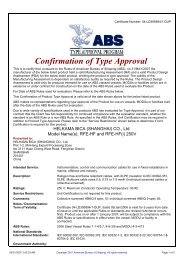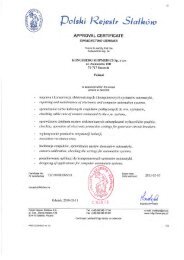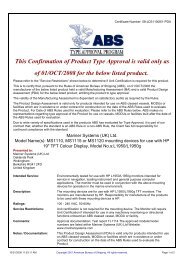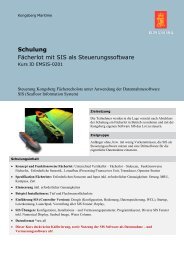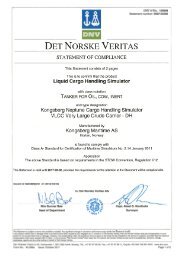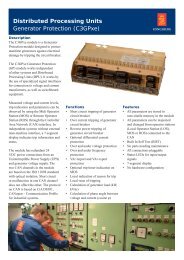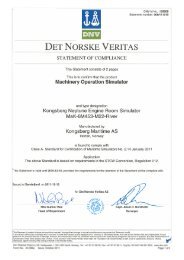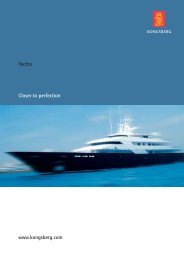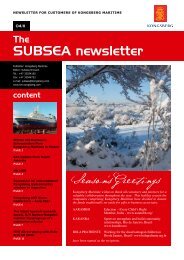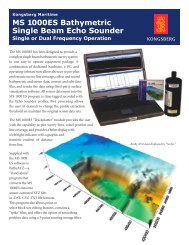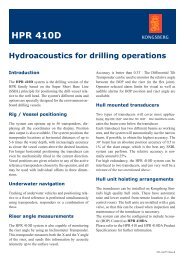Annual Report 2011 - Kongsberg Maritime - Kongsberg Gruppen
Annual Report 2011 - Kongsberg Maritime - Kongsberg Gruppen
Annual Report 2011 - Kongsberg Maritime - Kongsberg Gruppen
Create successful ePaper yourself
Turn your PDF publications into a flip-book with our unique Google optimized e-Paper software.
Elements of Management Remuneration –fixed salary and<br />
variable benefits<br />
The basis for wage setting is the aggregate level of a manager’s regular<br />
salary and variable benefits. Fixed salary consists of a basic salary plus<br />
regular benefits in kind and post-employment benefit plans. As of 2012<br />
the Board proposes to introduce a long-term incentive (LTI) as part of<br />
the fixed remuneration. Variable benefits consist of performance-based<br />
salary as well as the share program. Regular surveys are made of<br />
relevant markets to ensure that overall compensation packages are<br />
competitive, but not leading.<br />
Base salary<br />
The base salary should normally be the main element of the remuneration<br />
of management. It is normally considered once a year.<br />
Regular benefits in kind<br />
Key management personnel will normally be offered the benefits in kind<br />
that are common for comparable positions, e.g. free telephone service,<br />
free broadband service, newspapers, company car/car scheme and<br />
parking. No particular limitations have been placed on the type of<br />
benefits in kind that can be agreed.<br />
Pension plans<br />
Key management personnel shall normally have pension plans that<br />
guarantee pensions that are proportional to their salary level. Generally,<br />
this is satisfied by membership in KONGSBERG’s collective main<br />
pension plan for salaries of up to 12G.<br />
The Group’s collective main pension plan is a defined contribution<br />
plan. The contributions are 0 per cent of salary between 0 and 1G, 5 per<br />
cent of salary from 1 to 6G and 8 per cent of salary from 6 to 12G. The<br />
assets can be invested in one of three savings portfolio options,<br />
consisting of 30, 50 or 80 per cent shares, respectively. The scheme<br />
was introduced on 1 January 2008. Employees ages 52 or older at the<br />
time of transition remained in a closed defined benefit pension plan.<br />
Managers with a base salary in excess of 12G also earn pensions on<br />
the component of their salaries that exceeds 12G through an unfunded<br />
contribution scheme. The contribution is 18 per cent of the base salary<br />
exceeding 12G, and the investment options are the same as for the main<br />
pension plan. This scheme will continue in 2012.<br />
Employees aged 52 or older on 1 January 2008 remained in a closed<br />
defined benefit pension plan. There is a ceiling on maximum pensionable<br />
income of NOK 2 750 000, which was adjusted for inflation in line with<br />
the consumer price index at 1 January 2009 and thereafter annually on<br />
1 January.<br />
Two members of corporate executive management are covered by<br />
the old defined benefit plans. The CEO has a separate agreement for<br />
retirement at age 67. The combination of the National Insurance Scheme<br />
(based on full accrual) and KONGSBERG’s Obligatory Service Pension<br />
will provide a benefit of NOK 1 200 000 per year from age 67 to age 77<br />
and then NOK 1 000 000 each year from age 77 and for life. The<br />
amounts are adjusted annually in line with benefits paid from the<br />
National Insurance Scheme, i.e. to date with general salary increases<br />
less 0,75 per cent.<br />
Early retirement agreements have been and can be signed. However,<br />
KONGSBERG would like to limit the use of such agreements. As from<br />
1 January 2009, KONGSBERG introduced new rules regarding retirement<br />
with severance pay (early retirement), in line with the State’s<br />
Ownership <strong>Report</strong>. The rules offer a possibility for retirement from age<br />
65, but with a reciprocal right for KONGSBERG and the corporate<br />
executive to call for retirement with severance pay from age 63. The<br />
benefit equals 65 per cent of the annual salary, based on a minimum of<br />
15 years of accrual. If the employee resigns between ages 63 and 65,<br />
the pension earnings will be reduced compared with the defined<br />
contribution pension that applies from age 67. The company will<br />
consider a restructuring of early retirement in 2012.<br />
Three members of corporate executive management have older<br />
agreements that release them from the obligation to work from age 60.<br />
Providing a vested period of at least 10 years, the benefit is 90 per cent<br />
of salary from age 60, diminishing by 10 per cent per year to 60 per cent<br />
of salary from age 63 to age 67. Similarly, three other executive vice<br />
presidents have agreements that allow retirement from age 62. With a<br />
vested period of at least 15 years, the benefit will be 65 per cent of<br />
salary up to age 67. These older schemes were winded up in 2006 and<br />
2008, respectively.<br />
The CEO has a contract for retirement with severance pay of NOK<br />
1 400 000 per year from age 65 to age 67. The CEO and KONGSBERG<br />
can reciprocally call for retirement with severance pay from age 63 or<br />
64, based on compensation of NOK 1 300 000 or NOK 1 350 000 per<br />
year, respectively, up to age 65. The amounts are adjusted for annually in<br />
line with benefits paid from the National Insurance Scheme.<br />
Long-term incentive (LTI)<br />
From 2012, the Board proposes, as a part of the fixed remuneration, to<br />
implement a long-term incentive in the form of compensation of 25 per<br />
cent and 10-15 per cent of annual basic salary, respectively to CEO and<br />
other members of the corporate management. The reason for this is to<br />
be competitive with comparable companies. In order to be paid,<br />
KONGSBERG have to obtain a positive operating profit (EBIT) in the<br />
previous year. Participants in the scheme will be obliged to invest the<br />
net amount after tax in <strong>Kongsberg</strong> shares, purchased in the market and<br />
held in a period of three years. If participants leave the company on their<br />
own initiative, they have to repay an amount equal to equity value after<br />
tax on termination date for all shares that do not meet the three-year<br />
requirement. The scheme will not provide a basis for pension benefits.<br />
For those covered by the scheme, the annual maximum accrual of salary<br />
is reduced from 75 per cent to 60 per cent of basic salary. The scheme<br />
will subject to an evaluation annually.<br />
Performance-based salary<br />
KONGSBERG’s top executives and most important decision-makers<br />
have been given direct financial incentives linked to KONGSBERG’s<br />
development and improvement. For this purpose, in 2006 the Board<br />
adopted a performance-based scheme that covers roughly 90<br />
managers. The scheme is designed for the purpose that managers who<br />
perform well over time will earn an average performance-based salary of<br />
20-30 per cent of their regular salary. Performance-based salary is not<br />
included in pensionable salary. The scheme will be continued in 2012.<br />
The performance-based salary plan is based on three independent<br />
components – change in EBITA, operating margin achieved (if more<br />
than 10 per cent) and personal, non-financial targets. The performancebased<br />
scheme distinguishes between accrued performance-based<br />
salary (into an account) and paid performance-based salary (out of an<br />
account). The year’s accrued performance-based salary, positive or<br />
negative, will be credited to an individual’s performance-based salary<br />
account, and then 1/3 of any positive balance in the performance-based<br />
salary account will be paid out once the accounts have received final<br />
approval from the Board.<br />
Changes in the year’s EBITA, adjusted for 10 per cent calculated<br />
interest rate on changed capital expenditure (adjusted EBITA) is the<br />
most significant parameter of the performance-based salary for<br />
executives. The performance-based salary is weighted for a manager’s<br />
own sphere of responsibility and higher levels. Estimated performance-<br />
based salary is thereby favourable if the adjusted EBITA shows progress.<br />
In the event of a decrease in the adjusted EBITA, estimated performance-based<br />
salary can be negative, reducing the balance in the<br />
performance-based salary account.<br />
<strong>Annual</strong> accruals to the account may not exceed a maximum of 75 per<br />
cent of the basic salary, while annual disbursements from the account<br />
cannot exceed 50 per cent of the basic salary. The introduction of LTI<br />
will, as mentioned above, lead to a maximum annual performance-based<br />
salary of 60 per cent for those covered by the LTI scheme. The account<br />
will not be paid out in the event of resignation from the Group prior to<br />
retirement. The account has an equalising effect over time, encourages<br />
a long-term perspective and ensures that the participants have not only<br />
an upside, but also a downside.<br />
The performance-based salary provides no basis for pension and is<br />
annually assessed by the Compensation Committee and the Board of<br />
Directors to make sure that it works as intended and the requisite<br />
adjustments are made.<br />
Compensation linked to shares or to the development of the share price<br />
Key management personnel have an opportunity to participate fully in<br />
KONGSBERG’s discounted employee share program on the same terms<br />
as all Group employees. KONGSBERG has no scheme for the allocation<br />
of share options or other instruments associated with the company’s<br />
shares. There are no plans to introduce such schemes.<br />
2 INTRODUCTION<br />
7 DIRECTORS’ REPORT AND<br />
18 FINANCIAL STATEMENTS<br />
64 CORPORATE GOVERNANCE<br />
76 FINANCIAL CALENDAR AND ADDRESSES<br />
KONGSBERG <strong>Annual</strong> <strong>Report</strong> <strong>2011</strong> 49




